一般将来时
- 格式:doc
- 大小:37.55 KB
- 文档页数:6

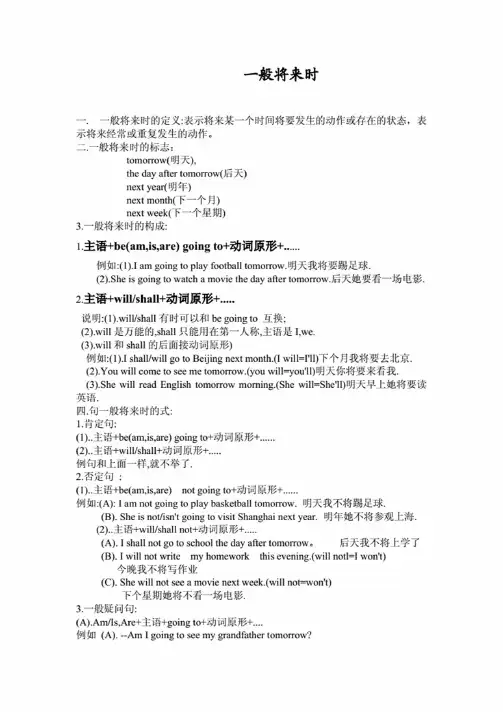
一般将来时一.一般将来时的定义:表示将来某一个时间将要发生的动作或存在的状态,表示将来经常或重复发生的动作。
二.一般将来时的标志:tomorrow(明天),the day after tomorrow(后天)next year(明年)next month(T—个月)next week(下一个星期)3.一般将来时的构成:1.主语^be(am,is,are)going to+动词原形+..例如:(1).I am going to play football tomorrow.明天我将要踢足球.(2).She is going to watch a movie the day after tomorrow.后天她要看一场电影.2.主语+will/shall+动词原形+.....说明:(l).will/shall有时可以和be going to互换;(2) .will是万能的,shall只能用在第一人称,主语是I,we.(3) .will和shall的后而接动词原形)例如shall/will go to Beijing next month.。
will=I11)下个月我将要去北京.(2) .You will come to see me tomorrow.(you will=you'll)明天你将要来看我.(3) .She will read English tomorrow moming.(She will=She'll)明天早上她将要读英语.四.句一般将来时的式:1.肯定句:(1) ..主语+be(am,is,are)going to+动词原形+......(2) ..主语+will/shall+动词原形+.....例句和上面一样,就不举了.2.否定句:(1)..主语+be(am,is,are)not going to+动词原形+......例如:(A):I am not going to play basketball tomorrow.明天我不将踢足球.(B).She is not/isn't going to visit Shanghai next year.明年她不将参观上海.(2)..主语+will/shall not+动词原形+.....(A).I shall not go to school the day after tomorrow o后天我不将上学了(B).I will not write my homework this evening.(will notl=I won't)今晚我不将写作业(C).She will not see a movie next week.(will not=won't)下个星期她将不看一场电影.3.一般疑问句:(A).Am/Is,Are+主语+going to+动词原形+....例如(A).—Am I going to see my grandfather tomorrow?明天我将去看我的爷爷吗?—Yes,you are.是的,你将去.(B).— Are you going to listening to the tape tomorrow?明天你将听录音带吗?—No,I am not.不,我不将.(C). —Is she going to Beijing next year? 明年我将去北京吗?-Yes,she is.是的,她将.(2).Will//shall+主语+动词原形+…例如(A). —Shall we play volleyball next class?下一节课我们将打排球吗?-Yes,you will,是的,你们将.(B). —Will you come here next week?下个星期你将来这儿吗?-Yes,I will.是的,我将.(C).--Will she teach us this term?这学期,她将教我们吗?—Yes,she will.是的,她将.4.特殊疑问句:(1).What(Where,How...)+be(am,is,are)+主语+going to+动词原形+...?例如:(A).—What are you going to do tomorrow? 明天你将要做什么?—rm going to the park? 我将要去动物园.(B).--Where are you going to swim? 你将要去哪儿游泳?—I'm going to swim in the river.(2). What(When,Where,How...)+主语+动词原形+...?例如:(A).---What will you do next week?下个星期你将要做什么?--1 will do my homeworko 我将要做作业.(B).—How will she come here tomorrow?明天她将要怎么来这儿?—She will come here by bus 。
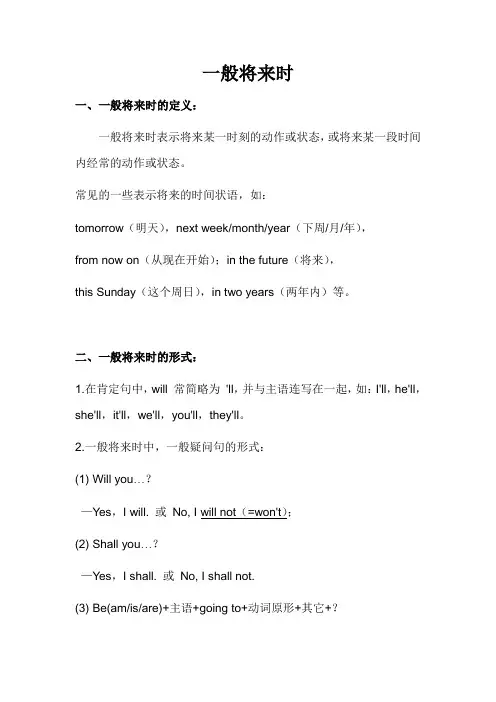
一般将来时一、一般将来时的定义:一般将来时表示将来某一时刻的动作或状态,或将来某一段时间内经常的动作或状态。
常见的一些表示将来的时间状语,如:tomorrow(明天),next week/month/year(下周/月/年),from now on(从现在开始);in the future(将来),this Sunday(这个周日),in two years(两年内)等。
二、一般将来时的形式:1.在肯定句中,will 常简略为'll,并与主语连写在一起,如:I'll,he'll,she'll,it'll,we'll,you'll,they'll。
2.一般将来时中,一般疑问句的形式:(1) Will you…?—Yes,I will. 或No, I will not(=won't);(2) Shall you…?—Yes,I shall. 或No, I shall not.(3) Be(am/is/are)+主语+going to+动词原形+其它+?如:Are you going to swim tomorrow?—Yes, I am./ No, I'm not.Is he/she going to play football next weekend?—Yes, he/she is./ No, he/she isn't.Are they going to go shopping this Sunday?—yes, they are./ No, they aren't.三、一般将来时的用法:1.一般将来时由“助动词shall(用于第一人称),或者will(用于第一、二、三人称)+动词原形”构成。
这种将来意义常常夹杂着情态意义即带有说话人的主观态度和看法,比如表示“预见”。
有时也含有“意愿”或“意图”的意思。
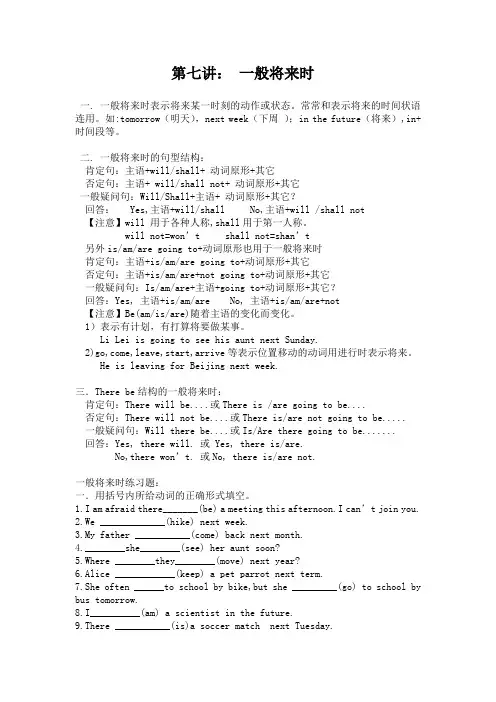
第七讲:一般将来时一. 一般将来时表示将来某一时刻的动作或状态。
常常和表示将来的时间状语连用。
如:tomorrow(明天),next week(下周);in the future(将来),in+时间段等。
二. 一般将来时的句型结构:肯定句:主语+will/shall+ 动词原形+其它否定句:主语+ will/shall not+ 动词原形+其它一般疑问句:Will/Shall+主语+ 动词原形+其它?回答: Yes,主语+will/shall No,主语+will /shall not【注意】will 用于各种人称,shall用于第一人称。
will not=won’t shall not=shan’t另外is/am/are going to+动词原形也用于一般将来时肯定句:主语+is/am/are going to+动词原形+其它否定句:主语+is/am/are+not going to+动词原形+其它一般疑问句:Is/am/are+主语+going to+动词原形+其它?回答:Yes, 主语+is/am/are No, 主语+is/am/are+not【注意】Be(am/is/are)随着主语的变化而变化。
1)表示有计划,有打算将要做某事。
Li Lei is going to see his aunt next Sunday.2)go,come,leave,start,arrive等表示位置移动的动词用进行时表示将来。
He is leaving for Beijing next week.三.There be结构的一般将来时:肯定句:There will be....或There is /are going to be....否定句:There will not be....或There is/are not going to be.....一般疑问句:Will there be....或Is/Are there going to be.......回答:Yes, there will. 或 Yes, there is/are.No,there won’t. 或No, there is/are not.一般将来时练习题:一.用括号内所给动词的正确形式填空。
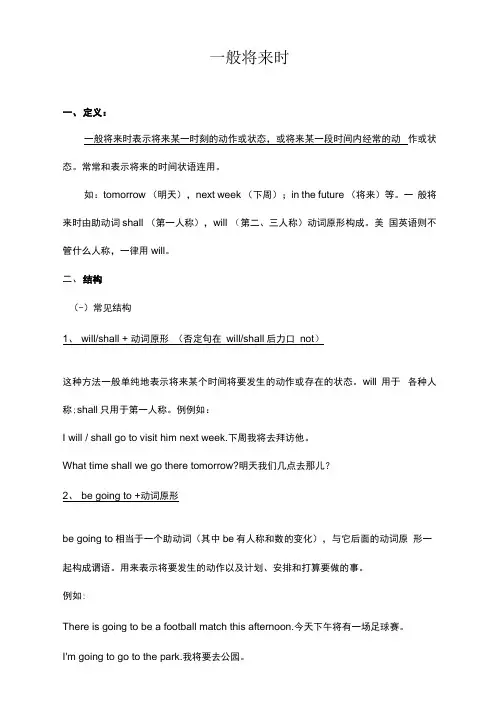
一般将来时一、定义:一般将来时表示将来某一时刻的动作或状态,或将来某一段时间内经常的动作或状态。
常常和表示将来的时间状语连用。
如:tomorrow (明天),next week (下周);in the future (将来)等。
一般将来时由助动词shall (第一人称),will (第二、三人称)动词原形构成。
美国英语则不管什么人称,一律用will。
二、结构(-)常见结构1、will/shall + 动词原形(否定句在will/shall后力口not)这种方法一般单纯地表示将来某个时间将要发生的动作或存在的状态。
will用于各种人称;shall只用于第一人称。
例例如:I will / shall go to visit him next week.下周我将去拜访他。
What time shall we go there tomorrow?明天我们几点去那儿?2、be going to +动词原形be going to相当于一个助动词(其中be有人称和数的变化),与它后面的动词原形一起构成谓语。
用来表示将要发生的动作以及计划、安排和打算要做的事。
例如:There is going to be a football match this afternoon.今天下午将有一场足球赛。
I'm going to go to the park.我将要去公园。
(-)常用结构1、用于"I expect, I'm sure, I think, I wonder 等的宾语从句"中。
Don't worry about the exam. I'm sure you'll pass.不要担心这次考试,我确信你会通过的。
2、用于祈使句和陈述句中。
Work hard and you will succeed.如果你努力,就会成功的。
3、与表示时间或条件的状语从句连用。
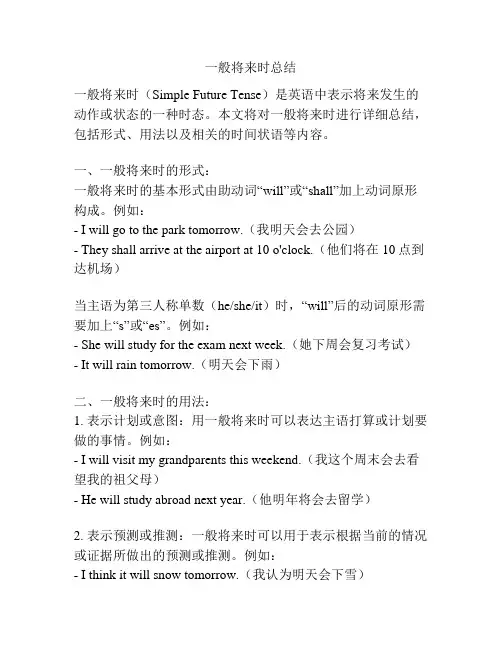
一般将来时总结一般将来时(Simple Future Tense)是英语中表示将来发生的动作或状态的一种时态。
本文将对一般将来时进行详细总结,包括形式、用法以及相关的时间状语等内容。
一、一般将来时的形式:一般将来时的基本形式由助动词“will”或“shall”加上动词原形构成。
例如:- I will go to the park tomorrow.(我明天会去公园)- They shall arrive at the airport at 10 o'clock.(他们将在10点到达机场)当主语为第三人称单数(he/she/it)时,“will”后的动词原形需要加上“s”或“es”。
例如:- She will study for the exam next week.(她下周会复习考试)- It will rain tomorrow.(明天会下雨)二、一般将来时的用法:1. 表示计划或意图:用一般将来时可以表达主语打算或计划要做的事情。
例如:- I will visit my grandparents this weekend.(我这个周末会去看望我的祖父母)- He will study abroad next year.(他明年将会去留学)2. 表示预测或推测:一般将来时可以用于表示根据当前的情况或证据所做出的预测或推测。
例如:- I think it will snow tomorrow.(我认为明天会下雪)- They believe she will win the competition.(他们相信她会赢得比赛)3. 表示意愿或允诺:一般将来时可以表达主语的意愿或承诺要做某事。
例如:- I will help you with your homework.(我会帮你做作业)- He will stop smoking.(他将戒烟)4. 表示预定的事件或安排的计划:一般将来时可以用于表示已经安排好的事件或计划。
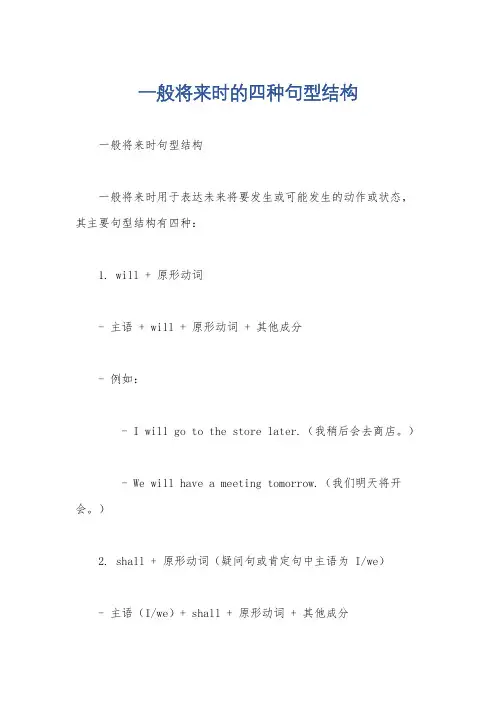
一般将来时的四种句型结构一般将来时句型结构一般将来时用于表达未来将要发生或可能发生的动作或状态,其主要句型结构有四种:1. will + 原形动词- 主语 + will + 原形动词 + 其他成分- 例如:- I will go to the store later.(我稍后会去商店。
)- We will have a meeting tomorrow.(我们明天将开会。
)2. shall + 原形动词(疑问句或肯定句中主语为 I/we)- 主语(I/we)+ shall + 原形动词 + 其他成分- 例如:- Shall I open the window?(我打开窗户好吗?)- We shall arrive at 10:00 AM.(我们将在上午 10:00 到达。
)3. be going to + 原形动词- 主语 + be going to + 原形动词 + 其他成分- 例如:- I am going to watch a movie tonight.(我今晚要去看电影。
)- They are going to build a new house.(他们打算建造一所新房子。
)4. be + about to + 原形动词- 主语 + be about to + 原形动词 + 其他成分- 例如:- I am about to leave.(我就要走了。
)- The train is about to depart.(火车就要出发了。
)一般将来时的用途一般将来时主要用于以下几种情况:- 表达未来将要发生的肯定动作或事件- 表达未来可能发生的动作或事件- 表示计划或打算- 表达预测或推测- 表示请求或建议(使用 shall 时)- 表示承诺或保证(使用 will 时)。
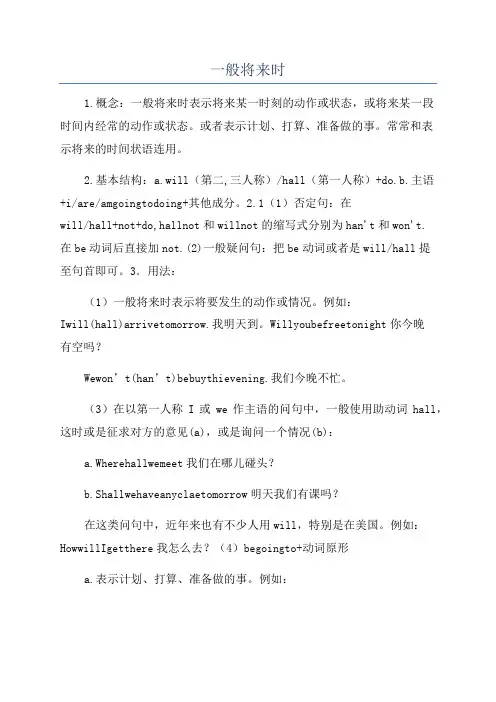
一般将来时1.概念:一般将来时表示将来某一时刻的动作或状态,或将来某一段时间内经常的动作或状态。
或者表示计划、打算、准备做的事。
常常和表示将来的时间状语连用。
2.基本结构:a.will(第二,三人称)/hall(第一人称)+do.b.主语+i/are/amgoingtodoing+其他成分。
2.1(1)否定句:在will/hall+not+do,hallnot和willnot的缩写式分别为han't和won't.在be动词后直接加not.(2)一般疑问句:把be动词或者是will/hall提至句首即可。
3.用法:(1)一般将来时表示将要发生的动作或情况。
例如:Iwill(hall)arrivetomorrow.我明天到。
Willyoubefreetonight你今晚有空吗?Wewon’t(han’t)bebuythievening.我们今晚不忙。
(3)在以第一人称I或we作主语的问句中,一般使用助动词hall,这时或是征求对方的意见(a),或是询问一个情况(b):a.Wherehallwemeet我们在哪儿碰头?b.Shallwehaveanyclaetomorrow明天我们有课吗?在这类问句中,近年来也有不少人用will,特别是在美国。
例如:HowwillIgetthere我怎么去?(4)begoingto+动词原形a.表示计划、打算、准备做的事。
例如:Wearegoingtoputupabuildinghere.我们打算在这里盖一座楼。
Howareyougoingtopendyourholiday假期你准备怎样过?b.表示即将发生或肯定要发生的事。
例如:Ithinkitigoingtonow.我看要下雪了。
(5)用一般现在时表示将来的情况。
在主从复合句中,当主句为一般将来时时,在if,aoona,until,when等引导的状语从句中用一般现在时代替一般将来时。
如:Ifitdoen’trainthiafternoon,we’llhaveaf ootballmatch.如果今天下午不下雨,我们将进行一场足球比赛。
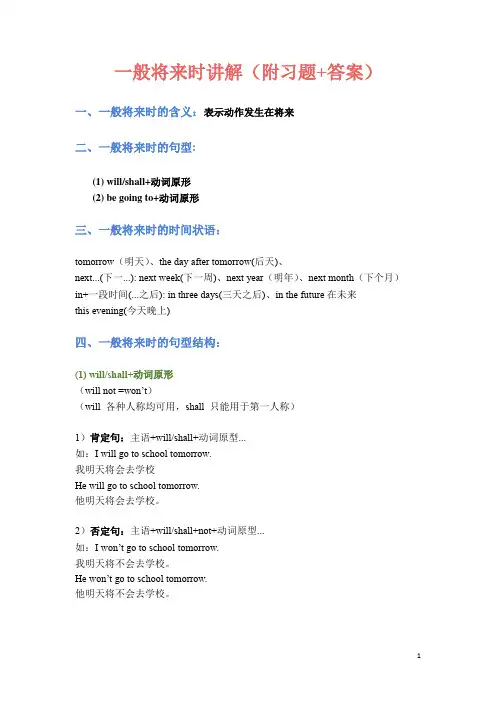
一般将来时讲解(附习题+答案)一、一般将来时的含义:表示动作发生在将来二、一般将来时的句型:(1) will/shall+动词原形(2) be going to+动词原形三、一般将来时的时间状语:tomorrow(明天)、the day after tomorrow(后天)、next...(下一...): next week(下一周)、next year(明年)、next month(下个月)in+一段时间(...之后): in three days(三天之后)、in the future在未来this evening(今天晚上)四、一般将来时的句型结构:(1) will/shall+动词原形(will not =won’t)(will 各种人称均可用,shall 只能用于第一人称)1)肯定句:主语+will/shall+动词原型...如:I will go to school tomorrow.我明天将会去学校He will go to school tomorrow.他明天将会去学校。
2)否定句:主语+will/shall+not+动词原型...如:I won’t go to school tomorrow.我明天将不会去学校。
He won’t go to school tomorrow.他明天将不会去学校。
3)一般疑问句:Will/Shall +主语+动词原型...如:Will you go to school tomorrow?你明天要去学校吗?Will he go to school tomorrow?他明天要去学校吗?肯定回答:Yes, 主语+will.如:Yes, I will.Yes, he will.否定回答:No,主语+will+not.如:No, I won’t.No, he won’t.4) 特殊疑问句:特殊疑问词+will/shall+主语+动词原型...如:What will you do tomorrow?你明天将会做什么?What will he do tomorrow?他明天将会做什么?(2) be going to+动词原形1)肯定句:主语+be going to +动词原型...如:I am going to buy some books tomorrow.我明天打算去买一些书。
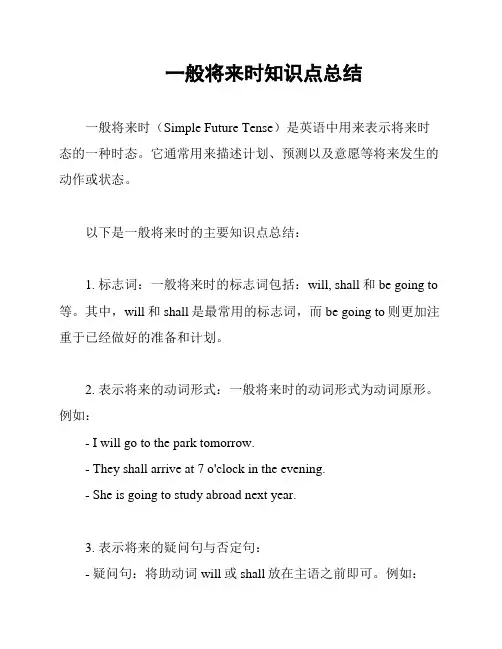
一般将来时知识点总结一般将来时(Simple Future Tense)是英语中用来表示将来时态的一种时态。
它通常用来描述计划、预测以及意愿等将来发生的动作或状态。
以下是一般将来时的主要知识点总结:1. 标志词:一般将来时的标志词包括:will, shall和be going to 等。
其中,will和shall是最常用的标志词,而be going to则更加注重于已经做好的准备和计划。
2. 表示将来的动词形式:一般将来时的动词形式为动词原形。
例如:- I will go to the park tomorrow.- They shall arrive at 7 o'clock in the evening.- She is going to study abroad next year.3. 表示将来的疑问句与否定句:- 疑问句:将助动词will或shall放在主语之前即可。
例如:- Shall we start the meeting now?- 否定句:在will或shall后面加上not即可。
例如:- I will not forget your birthday.- They shall not pass the exam.4. 表示将来的时间状语:- 一般将来时通常与一些表示将来的时间状语连用,例如:tomorrow, next week, in the future等。
例如:- She will visit her parents tomorrow.- I am going to travel abroad next month.总结:一般将来时是用来表达将来发生的动作或状态的时态。
通过掌握标志词、动词形式、疑问句与否定句以及时间状语等知识点,我们可以更加准确地使用一般将来时来表达自己的意思。

一般将来时是英语中常用的一种时态,用来表示将来发生的动作或状态。
本文将对一般将来时的定义、结构、标志词、用法和变化规则进行详细介绍。
一、定义一般将来时表示现在说话时或以后的某个时间将会发生的动作或状态。
二、结构一般将来时的结构为:will/shall + 动词原形。
主语+ will/shall + 动词原形。
三、标志词一般将来时的标志词有:tomorrow, next week, in the future等表示将来的时间状语。
另外,由于will/shall是情态动词,本身就具有表示将来的意义,因此在句子中也可以没有明显的表示将来时间的状语。
四、用法1. 表示将来的动作或状态,例如:I will go to the park tomorrow.(我明天会去公园。
)2. 表示意愿、打算、承诺等未来的确定性,例如:He will help you with the homework.(他会帮你做作业的。
)3. 表示预测、推测,常用于对未来情况的判断,例如:It will rain this afternoon.(今天下午会下雨。
)五、变化规则1. 肯定句的一般将来时结构为:will/shall + 动词原形。
例如:She wille to see me tomorrow.(她明天会来看我。
)2. 否定句的一般将来时结构为:will/shall + not + 动词原形。
例如:I will not go to the party tonight.(我今晚不会去参加派对。
)3. 疑问句的一般将来时结构为:will/shall + 主语+ 动词原形。
例如:Will youe to the meeting tomorrow?(你明天会来参加会议吗?)以上就是关于一般将来时的定义、结构、标志词、用法和变化规则的详细介绍。
希望对您有所帮助。
一般将来时是英语中最常用的一种时态之一,用于表示将来会发生的动作或状态。
小学英语一般将来时一、什么是一般将来时一般将来时是用来表示将来某个时间会发生的动作、事件或状态的时态。
它常常用于描述计划、打算、预测或意图。
二、一般将来时的构成一般将来时的构成是通过使用助动词"will"(在第三人称单数形式为"will")和动词的原形来表示将来的动作或状态。
以下是一些构成一般将来时的例子:1. 肯定句:主语 + will + 动词原形 + 其他例如:I will go to the park tomorrow.(我明天会去公园。
)2. 否定句:主语 + will not / won't + 动词原形 + 其他例如:She won't eat candy tonight.(她今晚不会吃糖果。
)3. 疑问句:Will + 主语 + 动词原形 + 其他?例如:Will they come to the party?(他们会来参加派对吗?)三、一般将来时的使用场景下面是一些小学英语中常见的使用一般将来时的场景:1. 表示计划或打算:I will visit my grandparents next month.(我下个月会去拜访我的祖父母。
)2. 表示预测或推测:It will rain tomorrow.(明天会下雨。
)3. 表示意愿或承诺:I will help you with your homework.(我会帮你做作业。
)4. 表示未来常态:The school will start at 8:00 AM tomorrow.(明天学校将会在早上8点开始。
)5. 表示请求、命令或建议:Will you please pass me the book?(你能给我递一下那本书吗?)四、注意事项1. "will"后面的动词使用原形形式。
2. 助动词"will"可以缩写成"’ll"。
一、一般将来时的概念与构成(一)概念:一般将来时表示将来某个时间要发生的动作或存在的状态,也表示将来经常或反复发生的动作。
一般将来时常与表示将来的时间状语连用,如:tomorrow(明天),next week(下周),next year(明年),in the future(将来),in 10 years(十年后)等。
例如:Will people use money in 100 years.一百年后人们还会使用钱吗?(in 100 years意为“一百年后”,而不是“在一百年里。
”)We will come to see you next week.下周我们将去看望你。
(二)构成:一般将来时可以由六种形式表示。
1、一般将来时主要由“助动词shall/will + 动词原形”构成。
shall 常用于第一人称,will常用于第二、三人称。
美国英语则不管什么人称,一律用will。
【注意】在英译汉时,一般将来时常常需要在动词原意前加“将”、“将会”等词。
但当一般将来时表示一种过去、现在和将来都是如此的倾向性或规律性的现象,译成汉语时常常要在动词原意前加“会”、“就会”等词。
例如:We shall further discuss the problem next week.下星期我们将进一步讨论这个问题。
As the water is warmed you will see bubbles form and escape.将水加热时,你会看到气泡形成并逸出。
【以下几种情况需注意】①在口语中,will在名词或代词后常缩略为’ll。
②一般将来时的否定形式在shall或will后加not。
will not缩写为won’t。
③一般将来时的疑问句形式是把shall或will提到主语前。
例如:Will people live to be 200 years old?人们将会活到两百岁吗?④在疑问句中,主语为第一人称(I和we)时,常用助动词shall。
一般将来时一、一般将来时的定义:一般将来时表示在将来时间将要发生的动作或存在的状态,与表示将来的时间连用。
tomorrow, next day(week, month, year…),soon, the day after tomorrow (后天)等。
如:She will visit Shanghai tomorrow.二、一般将来时的构成1.一般将来时有两种构成形式:(1)主语+shall/will+do(2)主语+ be going to + do 在表示“打算到某地去时”由于谓语动词go与going重复,一般可以只说be going to a place。
三、一般将来时的用法1.(1)主语+shall/will+do (will可用于所有人称,shall只用于第一人称I和we) 这种结构不是表示自己的打算、意图或计划,而是表示未来的事实或对将来的预测等如:No one will do heavy work.Roberts will do everything for us.(2)主语+ be going to + do这种结构常用来表达自己打算做某事、计划做某事或者有意做某事。
注意:be 动词要与主语的人称和数一致,如:I am going to do some reading tomorrow.He is going to have a piano lesson next week.We are going to have a party this Friday.2.通常情况下will 和 be going to能互换,但是be going to 与will 用法的也是有点区别的(1)只用will不用be going to的情况:①表示对未来时间与年龄的推测时,如:Tomorrow will be Monday.She will be thirteen next year.②表示必然发生时,如:Fish will die without water.People will die if all green plants die.(2)只用be going to而不用will的情况:如果表示已有迹象表明在不久的将来要发生的事情时,如:Look at those black clouds, It’s going to rain.3.某些动词如:go/come/leave/start/begin/arrive等,它们的现在进行时可以表示将来时,如:They are leaving for Shanghaitomorrow.My brother is coming here soon.四、一般将来时的句式变换肯定句:主语+shall/will+do主语+ be going to + do否定句:主语+shall/will+not+do(will not 可缩写成won’t)主语+ be+ not+ going to +do一般疑问句:shall/will+主语+ dobe+主语+going to+do特殊疑问句:疑问词+ shall/will+主语+do疑问词+be+主语+going to+do〔1〕一般将来时肯定句:人+will+动词+名词+时间I will go to school tomorrow.He will play football on Monday.〔2〕一般将来时否定句:人+won't+动词+名词+时间I won’t go to school tomorrow.He won’t play football on Monday.〔3〕一般将来时是非疑问句提问:will+人+动词+名词+时间对它的回答:Yes,人+will / No,人+won'tWill you go to school tomorrow? Yes,I will / No,I won'tWill he play football on Monday? Yes,he will / No,he won't〔4〕一般将来时开放问题提问:what+will+人+动词+时间对它的回答:人+will+动词+名词+时间What will you do tomorrow?I will go to school tomorrow.。
一.一般将来时:表示将来某个时间(相对于讲话时间)将要发生或存在(de)状态,也表示将来(de)一段时间内经常或反复发生(de)动作,常与表示将来(de)时间连用,如下:tomorrow明天 the next time下一次 the day after tomorrow后天 next week下周next year明年 tomorrow evening明天晚上 in the future将来 later(on)以后 before long不久后其基本句型如下:(一)will:will+动词原形,可以用于第一,第二,第三人称及其复数(不分人称).<1>陈述句肯定句:主语 + will + 动词原形(+将来(de)时间或地点).否定句:主语 + won’t + 动词原形(+将来(de)时间或地点)例句: I will play the piano at the concert.我将要在音乐会上弹钢琴.I won’t go to school tomorrow.我明天不上学.<2>特殊疑问句特殊疑问词+will+人称+动原+将来(de)时间答句:人称+will+动词原形.例句:What will you be in the year 2050 2050年你将会成为什么I will be a doctor.我将会成为一个医生.<3>一般疑问句Will+人称+动词原形(+将来(de)时间或地点)答句:Yes,人称+will. No,人称+won’t.例句:Will you visit your grandparents this Saturday 这周六你是否去拜访你(de)爷爷奶奶Yes, I will.(二)shall:shall+动词原形,只能用于第一人称(de)单复数(I, we)<1>陈述句肯定句:I/We shall + 动词原形(+将来(de)时间或地点).我/我们将要…否定句:I/We shall not + 动词原形(+将来(de)时间或地点).我/我们将不会…<2>特殊疑问句:特殊疑问词 + shall + 人称 + 动词原形(+将来(de)时间)答语: I/We shall + 动词原形例如:What shall we do 我们该怎么办Where shall I go 我该去哪呢<3>一般疑问句Shall I / we + 动词原形(+将来(de)时间或地点)答语:Yes, I / we shall. No, I / we shall not.例句:Shall I/ we go to school tomorrow 我/我们明天将要上学吗Yes, we shall. No, we shall not.(三)be going to结构,根据人称及单复数变换系动词be(de)形式(am,is, are).(1)be going to +动词原形,表示将来要做某事或发生某事.(2)be going to + 地点,表示将要去某地(3)be going there/here.将要去那里/这里一、单项选择.1. There __________ a meeting tomorrow afternoon.A. will be going toB. will going to beC. is going to beD. will go to be2. Charlie ________ here next month.A. isnt workingB. doesnt workingC. isnt going to workingD. wont work3. He ______ very busy this week, he ________ free next week.A. will be; isB. is; isC. will be; will beD. is; will be4. There ______ a dolphin show in the zoo tomorrow evening.A. wasB. is going to haveC. will haveD. is going to be5. –________ you ________ free tomorrow– No. I ________ free the day after tomorrow.A. Are; going to; willB. Are; going to be; willC. Are; going to; will beD. Are; going to be; will be6. Mother ________ me a nice present on my next birthday.A. will givesB. will giveC. givesD. give7. – Shall I buy a cup of tea for you–________.A. No, you wont.B. No, you arent.C. No, please dont.D. No, please.8. – Where is the morning paper– I ________ if for you at once.A. getB. am gettingC. to getD. will get9. ________ a concert next SaturdayA. There will beB. Will there beC. There can beD. There are10. If they come, we ________ a meeting.A. haveB. will haveC. hadD. would have11. He ________ her a beautiful hat on her next birthday.A. givesB. gaveC. will givingD. is going to giving12. He ________ to us as soon as he gets there.A. writesB. has writtenC. will writeD. wrote13. He ________ in three days.A. coming backB. came backC. will come backD. is going to coming back14. If it ________ tomorrow, well go roller-skating.A. isnt rainB. wont rainC. doesnt rainD. doesnt fine15. – Will his parents go to see the Beijing opera tomorrow – No, ________ .A. they willnt.B. they wont.C. they arent.D. they dont.16. Who _____ we ______ swimming with tomorrow afternoonA. will; goB. do; goC. will; goingD. shall; go17. We ________ the work this way next time.A. doB. will doC. going to doD. will doing18. Tomorrow he ________ a kite in the open air first, and then ________ boating in the park.A. will fly; will goB. will fly; goesC. is going to fly; will goesD. flies; will go19. The day after tomorrow they ________ a volleyball match.A. will watchingB. watchesC. is watchingD. is going to watch20. There ________ a birthday party this Sunday.A. shall beB. will beC. shall going to beD. will going to be21. They ________ an English evening next Sunday.A. are havingB. are going to haveC. will havingD. is going to have22. ________ you ________ free next SundayA. Will; areB. Will; beC. Do; beD. Are; be23. He ________ there at ten tomorrow morning.A. willB. isC. will beD. be24. ______your brother ______ a magazine from the libraryA. Are; going to borrowB. Is; going to borrowC. Will; borrowsD. Are; going to borrows25. – Shall I come again tomorrow afternoon–________ .A. Yes, pleaseB. Yes, you will.C. No, please.D. No, you wont.26. It ________ the year of the horse next year.A. is going to beB. is going toC. will beD. will is27. ________ open the windowA. Will you pleaseB. Please will youC. You pleaseD. Do you28. – Lets go out to play football, shall we– OK. I ________.A. will comingB. be going to comeC. comeD. am coming29. It ________ us a long time to learn English well.A. takesB. will takeC. spendsD. will spend30. The train ________ at 11.A. going to arriveB. will be arriveC. is going toD. is arriving改句子.5. Nancy is going to go camping.(改否定)Nancy _______ going to go camping.6. I’ll go and join them.(改否定)I _______ go _______ join them.7. I’m going to get up at 6:30 tomorrow.(改一般疑问句)_______ _______ _______ to get up at 6:30 tomorrow8. We will meet at the bus stop at 10:30.(改一般疑问句)_______ _______ meet at the bus stop at 10:30.9. She is going to listen to music after school.(对划线部分提问)_______ _______ she _______ _______ _______ after school10. My father and mother are going to see a play the day after tomorrow.(对划线部分提问)_______ _______ going to see a play the day after tomorrow.用所给词(de)适当形式填空.11. Today is a sunny day. We _______ (have) a picnic this afternoon.12. My brother _______ (go) to Shanghai next week.13. Tom often _______ (go) to school on foot. But today is rain. He _______ (go) to school by bike.14. What do you usually do at weekends I usually _______ (watch) TV and _______ (catch) insects15. It’s Friday today. What _______ she _______ (do) this weekend She _______ (watch) TV and _______ (catch) insects.16. What _______ (do) you do last Sunday I _______ (pick) apples on a farm. 17. Mary _______ (visit) her grandparents tomorrow.18. Liu Tao _______ (fly) kites in the playground yesterday.19. David _______ (give) a puppet show next Monday.20. I _______ (plan) for my study now。
一般将来时知识经纬1.了解一般将来时的概念2.掌握一般将来时的用法、句型转换3.灵活运用一般将来时知识要点一、一般将来时的概念一般将来时表示将来某个时间要发生的动作或存在的状态。
如:I am going to play football tomorrow.我明天打算去踢足球。
He is going to have a picnic next week. 他下星期去吃野餐。
I will go to the park this weekend. 这个周末我要去公园。
二、一般将来时的结构句式结构:主语+ will/be going to + 动词原形+ 其他成分。
三、时间状语tomorrow, soon,the day after tomorrow, next week, in +一段时间等。
四、一般将来时的用法1. 含有be going to的句型(1) 肯定句:主+ be going to +动词原形+其他如:I'm going to have a picnic this afternoon.(2) 否定句:主+be+ not going to +动词原形+其他如:I'm not going to have a picnic this afternoon.(3) 一般疑问句:Be + 主+ going to +动词原形+其他?(be提到句首,some 改为any, and改为or,第一二人称互换。
)如:Are you going to have a picnic this afternoon?肯定回答:Yes, I am.否定回答:No, I’m not.2. 含有will的句型(will可用于所有人称,shall只用于第一人称I和we)( 1 ) 肯定句:主+ will +动词原形+其他如:I will play football tomorrow.(2) 否定句:主+ won’t +动词原形+其他(will后加not成won't)如:I won’t play football tomorrow.(3) 一般疑问句:Will + 主+ +动词原形+其他?(will提到句首,some改为any, and改为or,第一二人称互换) 如:Will you play football tomorrow?肯定回答:Yes, I will.否定回答:No, I won’t.五、一般将来时的特殊疑问句一般情况下,一般将来时的对划线部分有三种情况。
1. 问人用Who 如:I am going to New York soon.→Who's going to New York soon?2. 问做什么事用What …do? 如:My father is going to watch a race with me this afternoon.→What is your father going to do with you this afternoon?3. 问什么时候用When. 例如:She's going to go to bed at nine.→When is she going to go to bed?六、同义句:在有些句子中,be going to = willI am going to go swimming tomorrow.= I will go swimming tomorrow.点睛题( )1. I ________ going to ________ a movie tomorrow.A. am; watchB. is; seeC. am; watching解析:I为第一人称,所以be动词要用am; to后面要接动词原形,因此用watch。
答案:A( )2.They ________ to have a test tonight.A. will goB. goesC. went解析:根据该句的时间状语tonight可以判断为一般将来时。
所以排除B和C。
再者根据将来时的结构:will+动词原形,所以选A.答案:A( )3.There is going to ________ a meeting the day after tomorrow.A. beB. haveC. has解析:因为is going to后接动词原形。
所以there be结构的be动词则为原形答案:A基础闯关(限时15分钟满分20分)一、用所给词的适当形式填空。
(每小题1分,共5分)1. We ________ (be) going to the zoo on Sunday.2. My sister ________(climb) the mountain tomorrow.3. I ________ (have) an English lesson this evening.4. My parents ________ (go) to the cinema tonight.5. If it is fine, we ________ (go) shopping.二、单项选择。
(每小题1分,共5分)( ) 1. It ______ sunny tomorrow.A. is goingB. is going to beC. is going toD. is going to is ( ) 2. I am going to _______ my teacher tomorrow.A. visitsB. visitC. visitedD. visiting( ) 3. She _______ going to Beijing tomorrow morning.A. isB. areC. amD. be ( ) 4. I _______ twelve years old next year..A. will beB. will amC. will areD. shall am ( ) 5. —Can you help me?—Sorry, I _______ .A. go outB. am going outC. went outD. am going三、按要求写句子。
(每小题2分,共10分)1. Tom is going to visit a farm. (改成否定句)_________________________________________________2. They will go and join us. (改成否定句)_________________________________________________3. She is going to play basketball after school. (改成一般疑问句)_________________________________________________4. Are you going to go fishing tomorrow? (肯定回答)_________________________________________________5. Is Mary going to the post office this afternoon? (否定回答)_________________________________________________名校培优(时15分钟共20分)一、单项选择题。
(每小题2分,共12分)( ) 1.—Will his parents go to visit the Great Wall tomorrow?—No, ________ .A. the y willn’tB. they won’tC. they aren’tD. they don’t ( ) 2. Tomorrow he ________ a kite in the open air first, and then ________ boating in the park.A. will fly; will goB. will fly; goesC. is going to fly; will goesD. flies; will go( ) 3.The day after tomorrow they ________ a volleyball match.A. will watchingB. watchesC. is watchingD. are going to watch ( ) 4.There________ a birthday party this Sunday.A. shall beB. will beC. shall going to beD. will going to be ( ) 5.He________ there at ten tomorrow morning.A. willB. isC. will beD. be( ) 6.Who ________ we ________ swimming with tomorrow afternoon?A. are; goB. do; goC. will; goingD. shall; go二、根据题目要求做题。
每小题2分,共8分)1. 你妈妈这个周末打算去购物吗?是,她打算去买一些水果。
—_____ your mother _______ ________ go shopping this ___________?—Yes, she _________. She ______ ________ __________ buy some fruits.2. 你们打算什么时候见面?What time _______ you _________ __________ meet?3. She is going to do her homework after school. (对划线部分提问)__________________________________________________________________ 4. Tom brushes his teeth every morning. (用tomorrow代替every来改写)_____________________________________________________________________一般将来时基础闯关参考答案一、1. are 2. will climb 3. will have 4. will go 5. will go二、1~5 BBAAB三、1. Tom isn’t going to visit a farm.2. They won’t go and join us.3. Is she going to play basketball after school.4. Yes, I am.5. No, she isn’t.一般将来时名校培优参考答案一、1~6 BADBCD二、 1. Is going to , weekend, is, is going to2. are, going, to3. what is she going to do after school?4. Tom will brush his teeth tomorrow.。